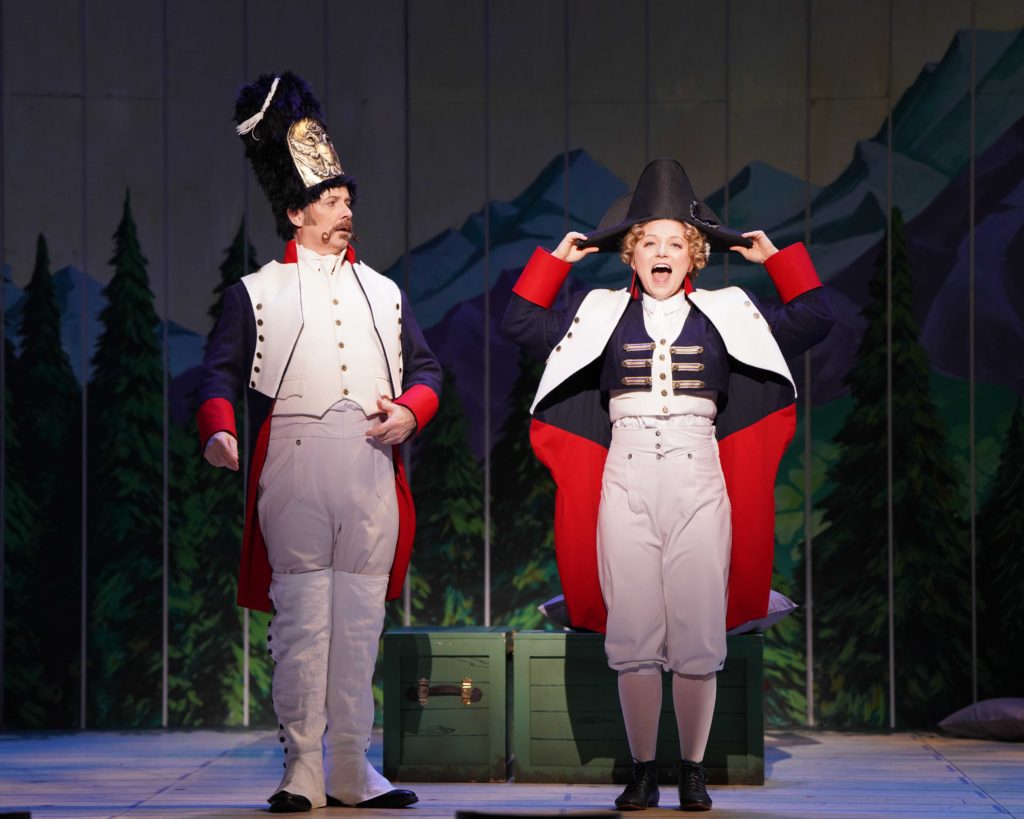Utah Opera’s “Daughter of the Regiment” wins hearts, minds and laughs

With its engaging and musically stunning production of Donizetti’s The Daughter of the Regiment, Utah Opera is establishing itself as a consummate producer of Bel Canto operas, particularly those in a comic vein.
Literally translated as “beautiful singing,” Bel Canto is a style of opera from the early 1800s marked by simple, tuneful arias that showcase the beauty, agility, and expressive qualities of the human voice. The company opened last season with a delightfully zany take on another Bel Canto classic — Rossini’s The Barber of Seville — and closed it with an exuberant production of Gilbert and Sullivan’sThe Pirates of Penzance. The latter, though not a Bel Canto opera, gives distinctly Bel Canto-style arias to its romantic leads.
All three productions feature musicianship of the highest quality alongside pratfalls, sight gags and corny ad libs that keep the audience laughing. Returning from last year’s Barber are director Michael Shell and baritone Matthew Burns as Regiment’s martial boss, Sergeant Sulpice. Returning from Pirates are Kevin Nakatani as Hortensius and Madison Leonard as the female lead, Marie. Jack Swanson, making his Utah Opera debut, plays Marie’s counterpart, Tonio.
Rarely in opera are two co-stars as well matched as Leonard and Swanson were in Saturday’s opening performance. They could have been cast solely on chemistry and how good they looked in each other arms, but both young artists also have stellar and sublimely compatible voices. They are undeniably rising stars.
Leonard won the audience over quickly with her ebullient rendition of her opening aria, a duet with Burns, which reveals Marie’s backstory as a foundling raised by the regiment. Her clear tone, ornamented with a tight vibrato, glided gracefully over Donizetti’s genial melody, and matched her character’s charm and fun-loving nature, which Leonard portrayed with winning facial expressions and swashbuckling physicality.
Swanson was Leonard’s equal in charm and vocal ability. An early comic high point of the first act was their love duet “Quoi! Vous m’aimez,” in which Marie answers Tonio’s first expression of love by putting him in a headlock and giving him a noogie. But his ardent pleas eventually prevailed. The duo’s musical and dramatic chemistry remained palpable as Marie softened towards Tonio and Leonard’s clear soprano blended exquisitely with Swanson’s light but powerful tenor — the latter demonstrating perfect intonation through the piece’s difficult French vowels, allowing his passion and musicality to come through.
Swanson’s precision, charm, and musicality were also on full display near the end of the first act in “Ah! Mes amis,” a vocal tour de force that, during a 1971 performance at the Met, earned Luciano Pavarotti 17 curtain calls and the moniker “King of the high Cs.” Swanson hit all nine of them perfectly and without breaking character or interrupting his melodic phrasing, but what really set the piece apart was the joy and gusto with which he sang.
Marie considers all the soldiers in the regiment to be her fathers, but it’s clear that Sergeant Sulpice does most of the paternal heavy lifting. Burns was an affable father figure, creating a loving, good-natured rapport with Leonard, and burnishing his dad energy with cringey jokes. Like other works written for the Opera Comique, Regiment features spoken dialogue between the arias, which this production performed in American English while keeping the arias in their original French. Burns’ lines were straight ‘80s sitcom, admonishing Marie for gallivanting around with “some dude.” When he catches Marie and said dude in a passionate embrace, he exclaims: “Holy canoodling catastrophe! What in the seven minutes in heaven is going on?!”
Hearing these lines next to Burns’ well-phrased arias in his rich baritone was a bit jarring, but for the most part, the production’s jokes landed. Compared to Shell’s staging in last season’s Barber, his directorial choices in Regiment were somewhat subdued, which matched the difference in tone between the two operas. Regiment is — noogies and dad jokes notwithstanding — actually the more nuanced comedy of the two. While not above a low-brow turn of phrase or a sight gag — including a recurring bit brilliantly executed by lighting designer Driscoll Otto — Shell created space for nuanced characters and deeply poignant moments.
Itbegins with a chorus of refugees who have fled their village to avoid the advancing French army — not exactly a farcical or humorous situation. Nakatani’s entrance as Hortensius the Butler dragging a huge trunk was the audience’s first clue that the opera was a comedy. Nakatani’s broad facial expressions and fussy bearing signaled that it was OK to laugh at his employer, the Marquise of Berkenfeld, played by Elise Quagliata, and her aria protesting that a woman of her station should not be subjected to such an indignity.
Nakatani and Quagliata were another winning comic duo in Regiment, and both sang beautifully. As the audience learns in the second act, the Marquise has a tragic backstory that makes her a more sympathetic character, and Quagliata ably brought out this less haughty and imperious side.
Conductor Stephanie Rhodes Russell, making her Utah Opera debut, underlined the nuances with her sensitive, distinctive interpretation of the score. The overtures to both acts grabbed the listener’s attention with inventive phrasing, and Russell followed the singers brilliantly, encouraging their flourishes and rubato liberties.
Russell and Leonard were a particularly effective team in Marie’s poignant arias. In “Il Faut Partir”, where Marie laments that she has to leave the regiment, Leonard floated above the chorus and pizzicato strings, trading well-phrased melodic lines with the oboe. In “Par le rang et par l’opulenc”, where she laments her upcoming marriage to a dim aristocrat, the orchestra’s lilting backdrop supported Leonard’s effusive runs as she sped up and slowed down. Their sudden silence, dropping out through an extended a’capella passage, helped to hold the audience spellbound.
Daughter of the Regiment continues 7 p.m. January 16 and 18, 7:30 p.m. January 20 and 2 p.m. January 22. usuo.org

